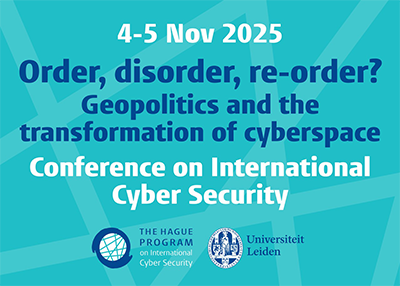
Tommaso Comunale's Visiting Fellowship
In November, Tommaso Comunale joined us for a Visiting Fellowship at The Hague Program on International Cyber Security at Leiden University's The Hague Campus. We sat down with him to hear about his fellowship experience.
Why were you interested in coming here?
I have only recently started approaching the empirical analysis of different forms of cybercrime and cyber-related topics. With an academic background and a PhD in criminology, I had long investigated the more traditional (and offline) forms of offending behaviors, with a focus on organized criminal groups. The past year, however, I began to be involved in the coordination of an EU project on cybercrime against businesses (CYBBAR) at the Center for the Study of Democracy (CSD). Eager to devote more attention to business cyber victimization, I then shifted my focus on cybercrime, the modus operandi of cyber criminals targeting companies, and cyber security regulations. During my research, I regularly come across the work conducted by The Hague Program, becoming more and more familiar with its publications, events, and initiatives, including the fellowship. The fellowship represented the chance not only to gain further insight into the Program’s activities but also to engage with international cybersecurity experts in a wide range of cyber topics. As it was indeed confirmed, the fellowship and the mutual exchange of ideas and research approaches provided me with valuable perspectives on the topic. As I completed the fellowship, I am confident that this experience will be very helpful for my future studies, projects, and overall path in this field.
What did you work on during the fellowship?
Over the two weeks of November 2022, I worked on CYBBAR Project by managing the project tasks while also cooperating with the different research teams. In terms of research activities, I focused on finalizing a Policy Brief titled “Cybercrime against businesses in the EU: Challenges to Reporting”. The policy brief highlights cybersecurity threats and risks faced by companies in the EU. It also features policy recommendations to enhance companies’ cyber resilience and improve cooperation with law enforcement authorities in the fight against cybercrime. The publication is expected to be disseminated in January 2023.
During the fellowship, I was invited to present my research at the Centre of Expertise Cyber Security of The Hague University of Applied Sciences. I also attended the “2022 Conference on International Cyber Security: Navigating Narratives in Cyberspace” organized by The Hague Program – a unique opportunity to engage with cyber security experts from all over the world.
What's next for you?
The Fellowship in The Hague allowed me to be part of a collaborative work environment and I am thankful to the colleagues I met at the Program for their interest in my research activities. The conference and the meetings I attended provided me with new insights and perspectives also for my current and future work.
My next steps will be to continue with my engagement on the CYBBAR Project. During 2023, I will be focusing on the analysis and publication of the survey results on the cyber victimization of businesses. The emphasis will be on factors for underreporting to law enforcement authorities, to ultimately foster effective public-private cooperation in the fight against cybercrime.
Are you also interested to join our Visiting Fellowship Program? Applications for a Fall 2023 stay are welcomed until 31 May 2023. Check out the Fellowships section for more information and the application process.



































_400x286.png)


















































_400x286.jpg)



